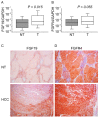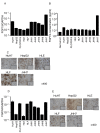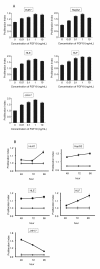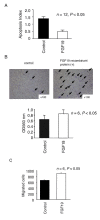Fibroblast growth factor 19 expression correlates with tumor progression and poorer prognosis of hepatocellular carcinoma
- PMID: 22309595
- PMCID: PMC3293719
- DOI: 10.1186/1471-2407-12-56
Fibroblast growth factor 19 expression correlates with tumor progression and poorer prognosis of hepatocellular carcinoma
Abstract
Background: Although fibroblast growth factor 19 (FGF19) can promote liver carcinogenesis in mice, its involvement in human hepatocellular carcinoma (HCC) has not been well investigated. FGF19, a member of the FGF family, has unique specificity for its receptor FGFR4. This study aimed to clarify the involvement of FGF19 in the development of HCC.
Methods: We investigated human FGF19 and FGFR4 expression in 40 hepatocellular carcinoma specimens using quantitative real-time reverse transcription polymerase chain reaction (RT-PCR) analysis and immunohistochemistry. Moreover, we examined the expression and the distribution of FGF19 and FGFR4 in 5 hepatocellular carcinoma cell lines (HepG2, HuH7, HLE, HLF, and JHH7) using RT-PCR and immunohistochemistry. To test the role of the FGF19/FGFR4 system in tumor progression, we used recombinant FGF19 protein and small interfering RNA (siRNA) of FGF19 and FGFR4 to regulate their concentrations.
Results: We found that FGF19 was significantly overexpressed in HCCs as compared with corresponding noncancerous liver tissue (P < 0.05). Univariate and multivariate analyses revealed that the tumor FGF19 mRNA expression was an independent prognostic factor for overall and disease-free survival. Moreover, we found that the FGF19 recombinant protein could increase the proliferation (P < 0.01, n = 12) and invasion (P < 0.01, n = 6) capabilities of human hepatocellular carcinoma cell lines and inhibited their apoptosis (P < 0.01, n = 12). Inversely, decreasing FGF19 and FGFR4 expression by siRNA significantly inhibited proliferation and increased apoptosis in JHH7 cells (P < 0.01, n = 12). The postoperative serum FGF19 levels in HCC patients was significantly lower than the preoperative levels (P < 0.01, n = 29).
Conclusions: FGF19 is critically involved in the development of HCCs. Targeting FGF19 inhibition is an attractive potential therapeutic strategy for HCC.
Figures







Similar articles
-
Klotho-beta and fibroblast growth factor 19 expression correlates with early recurrence of resectable hepatocellular carcinoma.Liver Int. 2019 Sep;39(9):1682-1691. doi: 10.1111/liv.14055. Epub 2019 Jul 11. Liver Int. 2019. PMID: 30698907
-
Up-regulation of fibroblast growth factor 19 and its receptor associates with progression from fatty liver to hepatocellular carcinoma.Oncotarget. 2016 Aug 9;7(32):52329-52339. doi: 10.18632/oncotarget.10750. Oncotarget. 2016. PMID: 27447573 Free PMC article.
-
Fibroblast Growth Factor 19-Mediated Up-regulation of SYR-Related High-Mobility Group Box 18 Promotes Hepatocellular Carcinoma Metastasis by Transactivating Fibroblast Growth Factor Receptor 4 and Fms-Related Tyrosine Kinase 4.Hepatology. 2020 May;71(5):1712-1731. doi: 10.1002/hep.30951. Epub 2020 Feb 10. Hepatology. 2020. PMID: 31529503
-
FGF19-FGFR4 Signaling in Hepatocellular Carcinoma.Cells. 2019 Jun 4;8(6):536. doi: 10.3390/cells8060536. Cells. 2019. PMID: 31167419 Free PMC article. Review.
-
Targeted inhibition of the FGF19-FGFR4 pathway in hepatocellular carcinoma; translational safety considerations.Liver Int. 2014 Jul;34(6):e1-9. doi: 10.1111/liv.12462. Epub 2014 Jan 24. Liver Int. 2014. PMID: 24393342 Review.
Cited by
-
Regulation of amphiregulin gene expression by β-catenin signaling in human hepatocellular carcinoma cells: a novel crosstalk between FGF19 and the EGFR system.PLoS One. 2012;7(12):e52711. doi: 10.1371/journal.pone.0052711. Epub 2012 Dec 20. PLoS One. 2012. PMID: 23285165 Free PMC article.
-
Exome sequencing of hepatocellular carcinomas identifies new mutational signatures and potential therapeutic targets.Nat Genet. 2015 May;47(5):505-511. doi: 10.1038/ng.3252. Epub 2015 Mar 30. Nat Genet. 2015. PMID: 25822088 Free PMC article.
-
JNK-mediated disruption of bile acid homeostasis promotes intrahepatic cholangiocarcinoma.Proc Natl Acad Sci U S A. 2020 Jul 14;117(28):16492-16499. doi: 10.1073/pnas.2002672117. Epub 2020 Jun 29. Proc Natl Acad Sci U S A. 2020. PMID: 32601222 Free PMC article.
-
Hnf1b controls pancreas morphogenesis and the generation of Ngn3+ endocrine progenitors.Development. 2015 Mar 1;142(5):871-82. doi: 10.1242/dev.110759. Development. 2015. PMID: 25715395 Free PMC article.
-
Lenvatinib combined with nivolumab in advanced hepatocellular carcinoma-real-world experience.Invest New Drugs. 2022 Aug;40(4):789-797. doi: 10.1007/s10637-022-01248-0. Epub 2022 Apr 28. Invest New Drugs. 2022. PMID: 35477812 Free PMC article.
References
MeSH terms
Substances
LinkOut - more resources
Full Text Sources
Other Literature Sources
Medical
Miscellaneous

